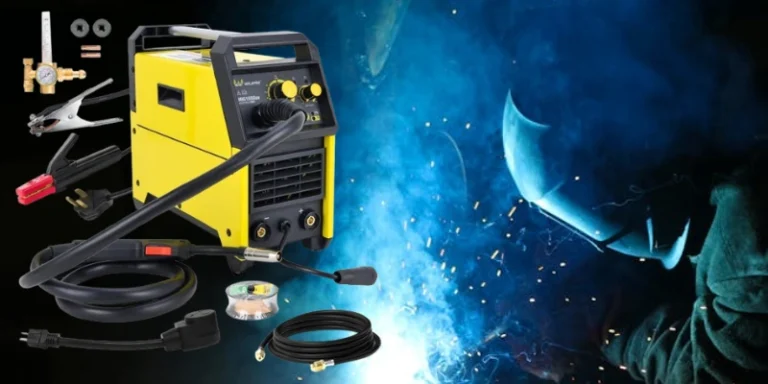Getting into welding can be exciting, but choosing your first welder is often confusing. You’ll see different processes (MIG, Stick, TIG), lots of technical numbers, and prices from entry‑level to professional.
This guide focuses on beginner‑friendly welders that are easy to set up, forgiving to learn on, and affordable. For each machine below, you’ll see what makes it stand out, key specs in plain English, real pros and cons, and who it’s best for. After the product reviews, you’ll find a simple buying guide and FAQs to help you pick the right starter welder for your shop or garage.
Best Welder for Beginners (Short Answer)
For most beginners, the best welder is a compact inverter with easy controls, 110 V (or dual‑voltage) input, and a forgiving arc. Strong beginner‑friendly options include:
- Weldpro 155 Amp MIG Welder: Dual‑voltage 3‑in‑1 (flux‑core MIG, gas MIG, stick), synergic settings, and enough power for most home projects.
- Lincoln Electric Weld‑PAK 90i FC: Simple 120 V flux‑core wire‑feed welder from a major brand; very easy to learn on, no gas bottle required.
- YESWELDER MIG‑165DS PRO: Dual‑voltage 4‑in‑1 (flux‑core MIG, gas MIG, stick, Lift TIG) with synergic control; ideal if you want one machine that can grow with your skills.
If you just need a cheap, tough starter for basic repairs, a small stick welder like the Hpoouo 200 A mini stick welder or HGNVGZ MMA‑250A is also a good first choice, as long as you’re okay learning the slightly steeper stick process.
Table of Contents
17 Best Welder for Beginners – Beginner‑Friendly Picks for 2026
1. Weldpro 155 Amp MIG Welder – Best Dual‑Voltage 3‑in‑1 Starter
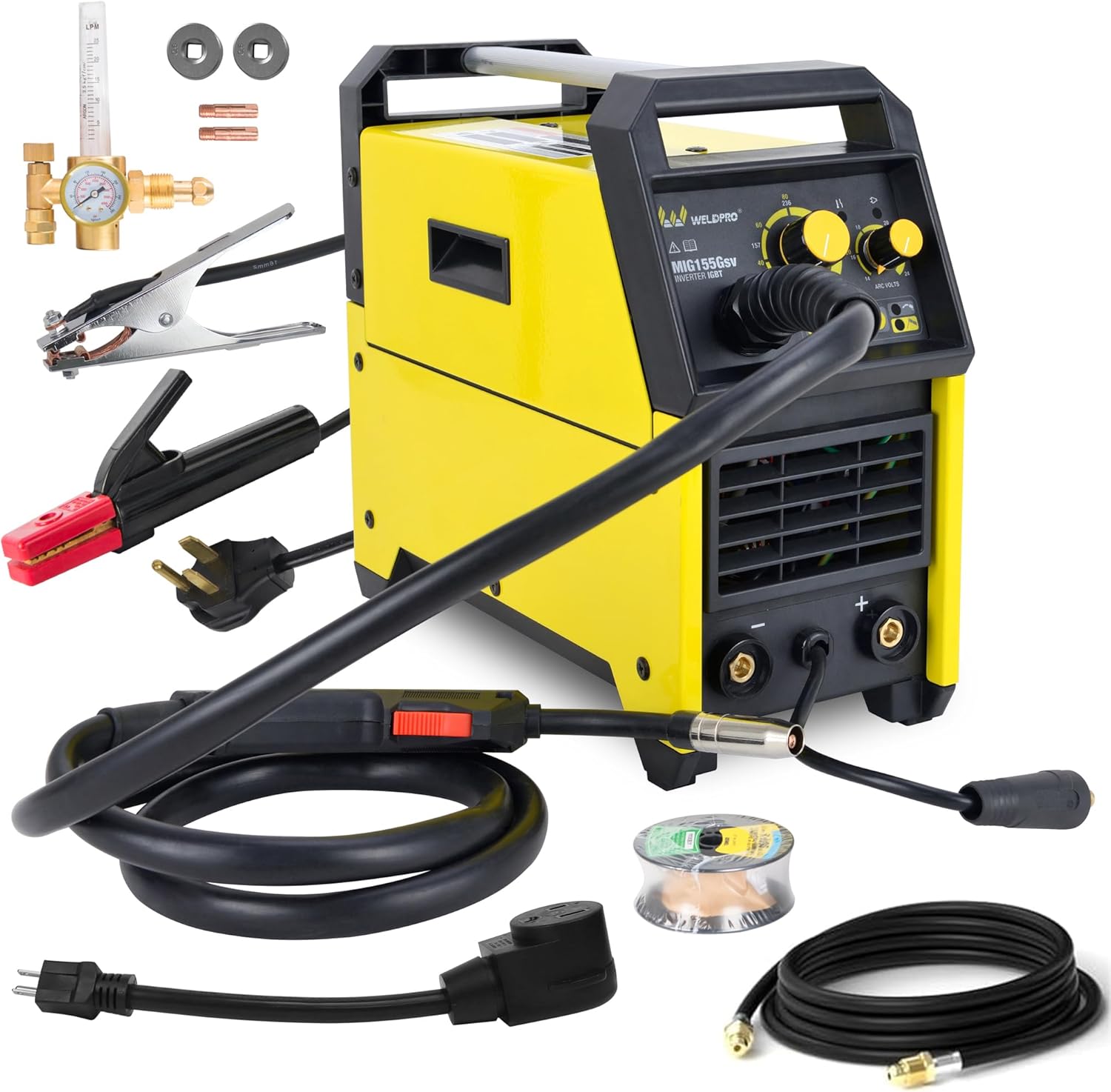
Weldpro 155 Amp MIG Welder
Dual‑voltage 3‑in‑1 inverter that handles flux‑core MIG, gas MIG, and stick, with synergic control and a compact 21 lb body for home and small‑shop use.
Check PriceWhy it stands out
This Weldpro gives beginners three popular processes (flux‑core MIG, gas MIG, and stick) in one small inverter, with synergy control that helps dial in settings automatically.
Key points
- Up to 155 A output
- Dual‑voltage: 110 V / 220 V auto‑sensing
- Processes: Flux‑core MIG, gas MIG, stick (MMA)
- Approx. size 14.96 × 13.58 × 6.69 in; about 21.2 lb
- Built‑in safety: over‑current, over‑heat, over‑voltage
Pros
- True multi‑process machine for one price
- Dual‑voltage works in most garages or small shops
- Synergic control reduces setup guesswork
- Enough power for most beginner metal projects
Cons
- TIG is scratch‑start only and needs extra torch
- Not ideal for very thick steel or all‑day production
- More menus/settings than a basic stick welder
Best for
New welders who want a single machine that can grow with them from basic flux‑core to gas MIG and occasional stick work.
2. 250A 110/220V Stick Welder – Best Synergic Stick Welder for Starters
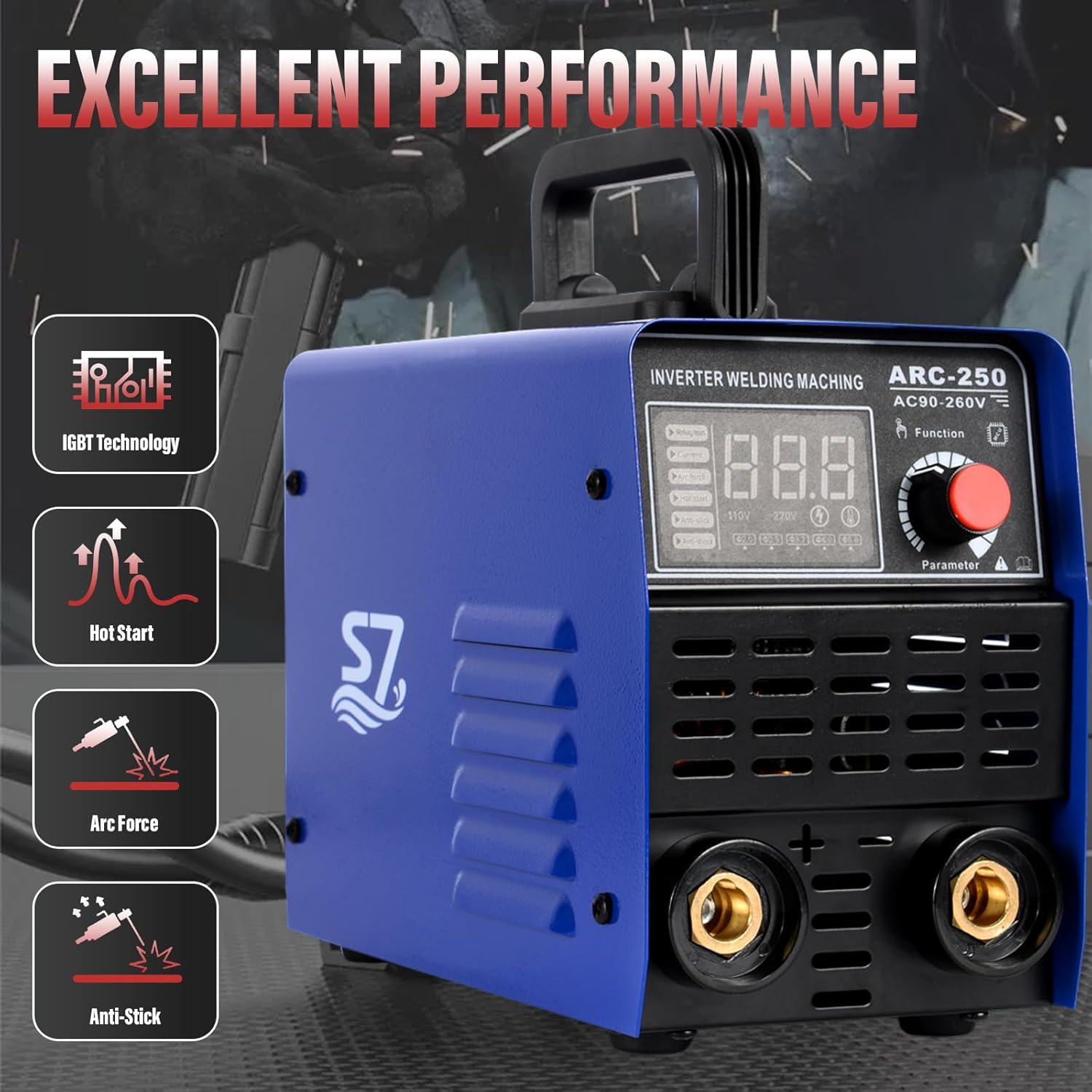
250A 110/220V Stick Welder
Portable 250 A stick/Lift TIG welder with dual‑voltage input, synergic control, hot start, arc force, and anti‑stick for smooth arc starts.
Check PriceWhy it stands out
This machine focuses on making stick welding easier with synergic control, hot‑start, and anti‑stick, so beginners spend less time fighting the rod and more time practicing beads.
Key points
- 110 V / 220 V dual‑voltage input
- Up to 250 A output
- Stick and basic Lift TIG capability
- LED digital panel with simple knob control
- Weighs about 9.5 lb, carry strap included
Pros
- High amperage for a small unit
- Synergic setup helps beginners choose sensible currents
- Works with common rods like E6010, E6011, E6013, E7018
- Good built‑in protections and cooling
Cons
- No MIG function
- TIG requires a separate torch and more skill
- Housing and leads are budget quality compared to big brands
Best for
Beginners who mainly want to learn stick welding on a compact, affordable machine that can plug into either 110 V or 220 V.
3. HGNVGZ Super Mini Stick Welder (Orange) – Best Ultra‑Portable First Welder
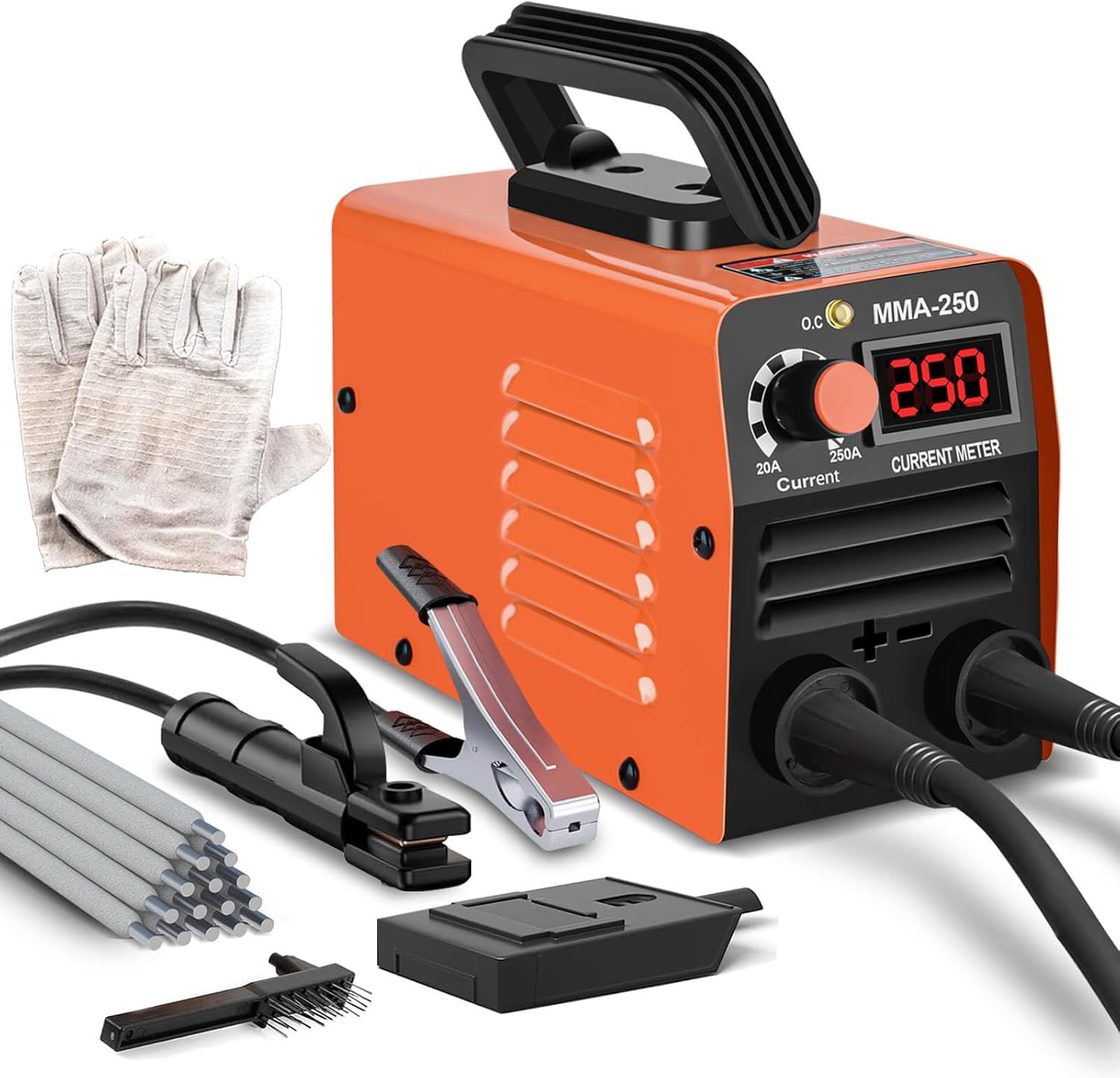
HGNVGZ Super Mini Stick Welder (Orange)
Tiny 110 V, 250 A MMA inverter that comes with rods, leads, and gloves, plus hot‑start, arc‑force, and anti‑stick functions in a backpack‑size unit.
Check PriceWhy it stands out
This is one of the smallest real welders around, light enough to carry anywhere, yet capable of 250 A for short welds on typical DIY materials.
Key points
- 110 V input, up to 250 A output
- IGBT inverter with hot‑start and arc‑force
- Weight around 6.3 lb (machine itself closer to 3.5–4.3 lb)
- Kit includes 10 rods, gloves, electrode holder, ground clamp
- Protective features for over‑current, over‑heat, and voltage swings
Pros
- Extremely compact and easy to store
- Perfect for quick repairs and learning basic stick technique
- Comes ready to weld with rods and basic PPE
- Good value for occasional/portable use
Cons
- Limited duty cycle on higher amps
- Stick‑only; no MIG or TIG functions
- Leads and clamps are on the light‑duty side
Best for
Beginners who want a super‑portable stick welder for small home repairs, fences, and light fabrication without committing to a big shop setup.
4. Lincoln Electric Weld‑PAK 90i FC (K5255‑1) – Best Brand‑Name Flux‑Core Starter
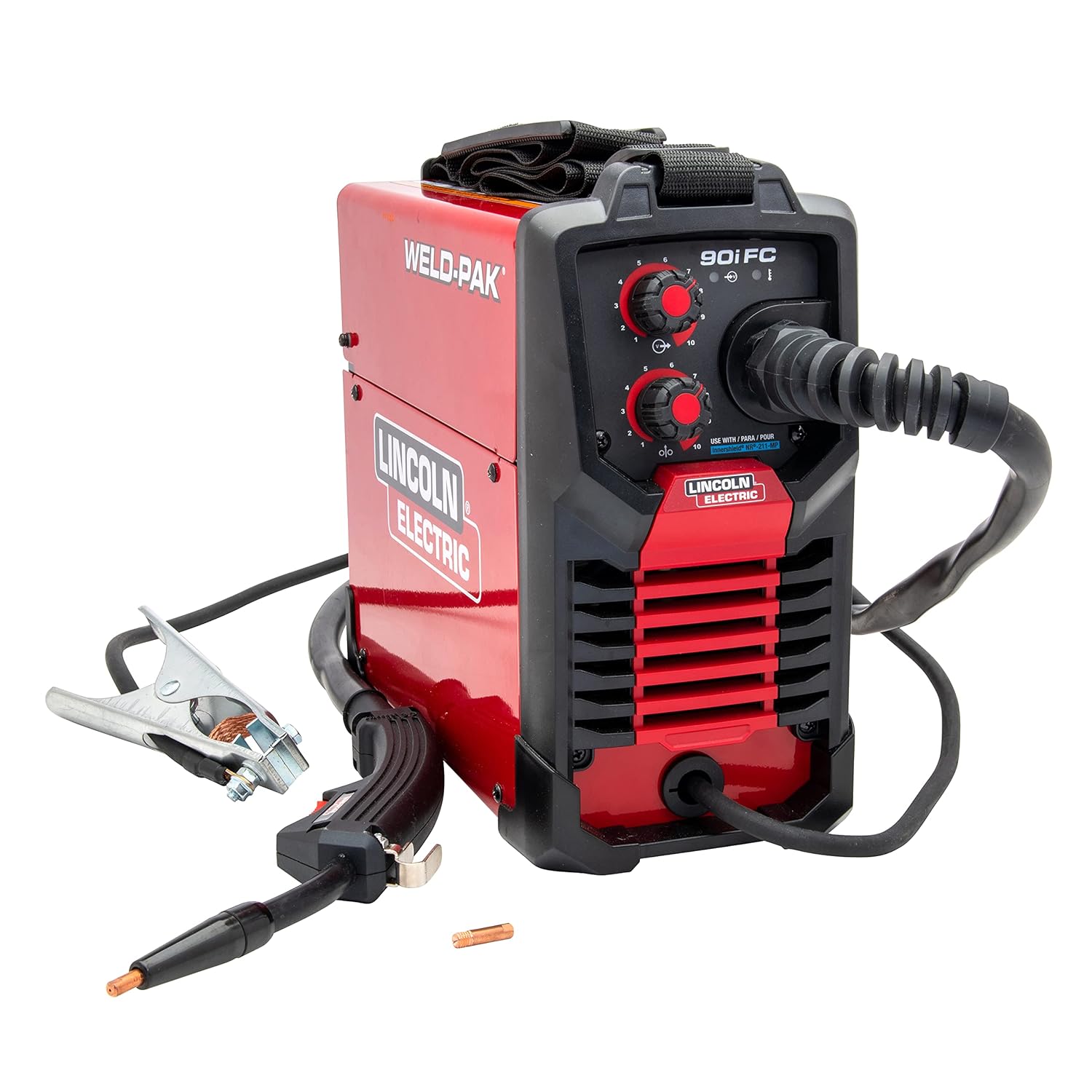
Lincoln Electric Weld‑PAK 90i FC
Lightweight 120 V flux‑core wire‑feed welder in a metal case with shoulder strap, designed for small projects and easy, gas‑free setup.
Check PriceWhy it stands out
Lincoln’s Weld‑PAK 90iFC is a trusted name‑brand machine that focuses on one thing, simple flux‑core welding, without complicated menus or extra modes.
Key points
- 120 V input, runs off standard household power
- Flux‑core only, welds up to about 1/4″ mild steel
- Weighs roughly 15 lb with shoulder strap
- Two‑knob operation (wire speed & voltage) for easy setup
- 4.7★ average rating from hundreds of users
Pros
- Very beginner‑friendly controls
- No gas cylinder needed for basic welding
- Durable metal case built for jobsite and garage use
- Strong manufacturer support and parts availability
Cons
- Flux‑core only, no solid‑wire MIG or stick
- Higher price than no‑name imports with more modes
- Single‑voltage 120 V limits output compared with 220 V units
Best for
Beginners who want a straightforward, reliable flux‑core welder from a major brand for home repairs, thin material, and learning MIG‑style wire feeding.
5. GNI Super MINI 250A Stick Welder – Best Low‑Cost Complete Stick Kit
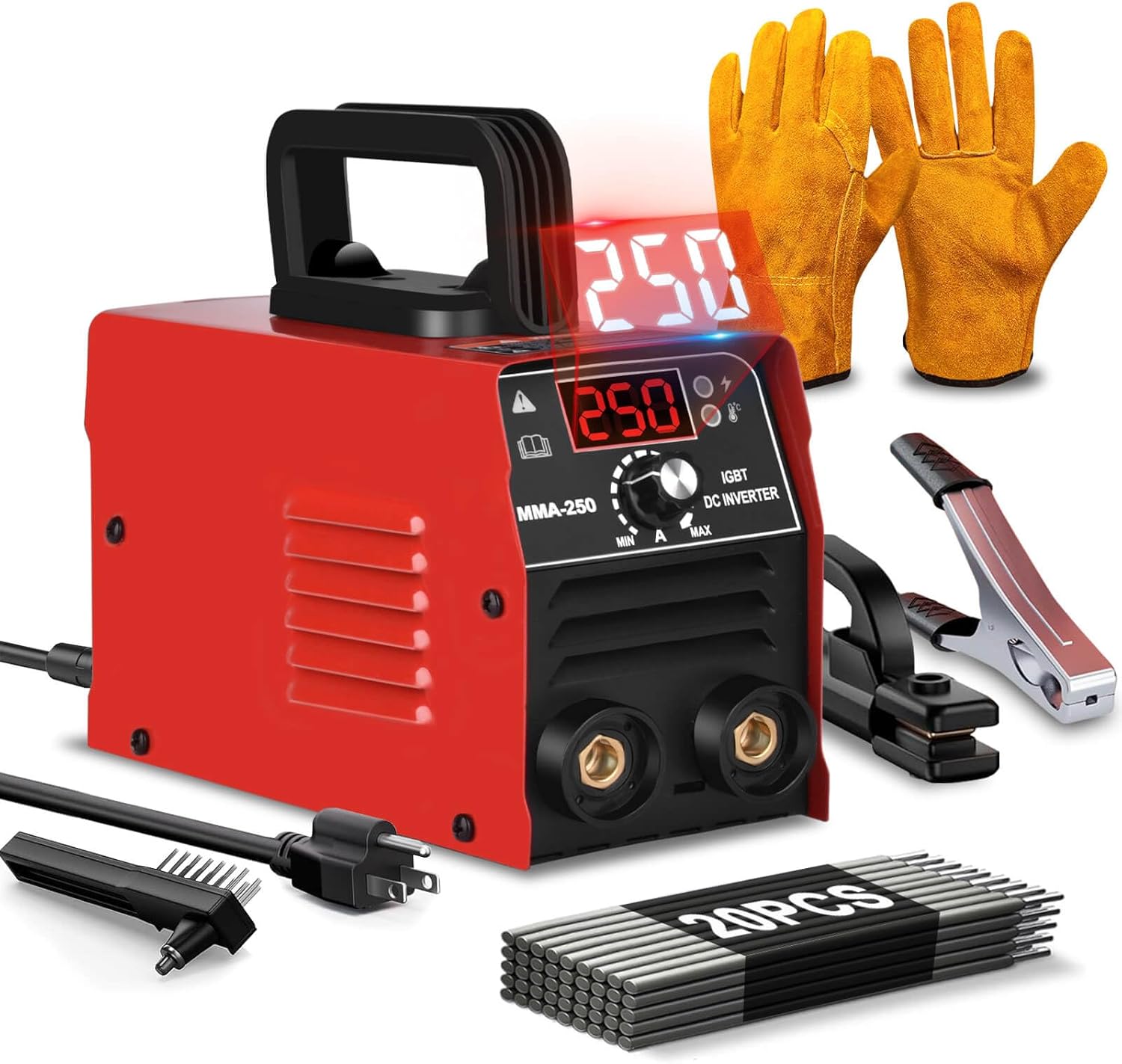
GNI Super MINI 250A Stick Welder
Budget‑friendly 110 V, 250 A arc welder that ships with 20 rods, gloves, and hand tools, using IGBT inverter tech and anti‑stick features.
Check PriceWhy it stands out
For the price of some single accessories, you get a 250 A welder plus rods and gloves, ideal if you’re testing the waters and don’t want a big upfront investment.
Key points
- 110 V input, 20–250 A output
- IGBT inverter with hot‑start and anti‑stick
- Includes 20 rods, gloves, chip hammer, clamps
- Weighs about 6.4 lb, compact housing
- 4.3★ rating from dozens of users
Pros
- Very inexpensive way to start stick welding
- Comes with consumables to get you going
- Enough power for typical DIY thicknesses
- Built‑in safety and cooling fan
Cons
- Light‑duty cables and clamps
- Shorter lifespan likely than pro‑grade machines
- Stick‑only; less flexible than multi‑process units
Best for
New welders on a tight budget who mainly plan small home repairs and want a complete starter kit in one purchase.
6. Hpoouo ARC‑200 Stick Welder – Best Compact 200 A Welder for Home Garages
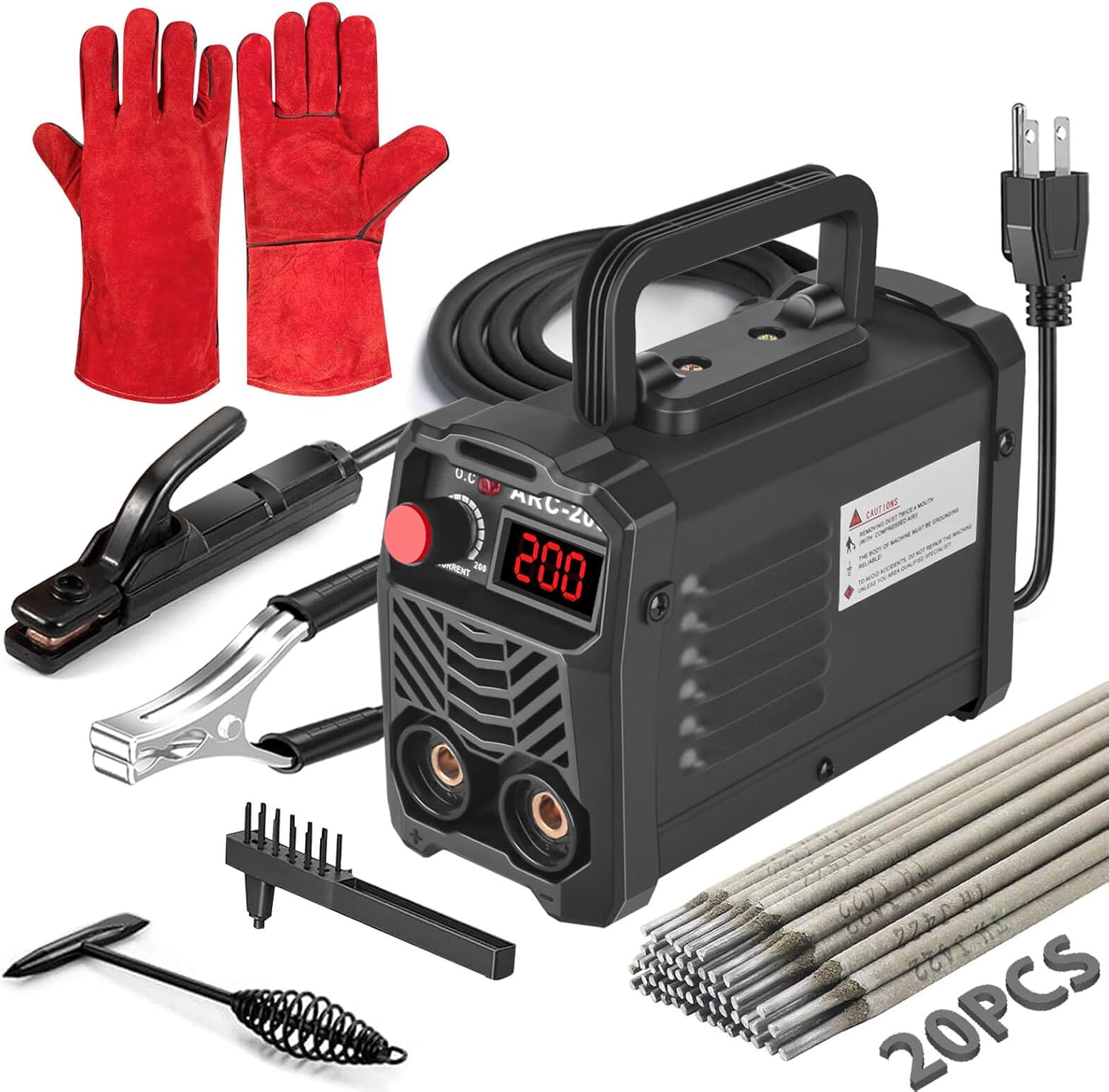
Hpoouo 200Amp Super MINI Stick Welder
110 V, 200 A mini welder with hot‑start, arc‑force, and anti‑stick, supplied with 20 rods and two chip hammers for home and DIY use.
Check PriceWhy it stands out
This Hpoouo model strikes a balance between the tiny 125 A machines and bigger shop welders, compact but still capable of 200 A for more serious work.
Key points
- 110 V input, 20–200 A range
- Stick (MMA) process with IGBT inverter
- Includes 20 rods, 2 chip hammers, gloves, leads
- Product size about 7.8 × 3.9 × 5.3 in
- 4.5★ rating from 1,000+ users
Pros
- Good power for a 110 V mini welder
- Full accessory pack included
- Hot‑start and arc‑force make learning easier
- Compact and easy to store or carry
Cons
- Not designed for stainless steel without special rods
- No MIG or TIG; stick‑only
- Duty cycle will limit continuous high‑amp welding
Best for
Beginners who want a small but capable 200 A stick welder for garage repairs, fences, and structural odds‑and‑ends.
7. HGNVGZ Super Mini Stick Welder (Gray) – Best Pocket‑Size Beginner Welder
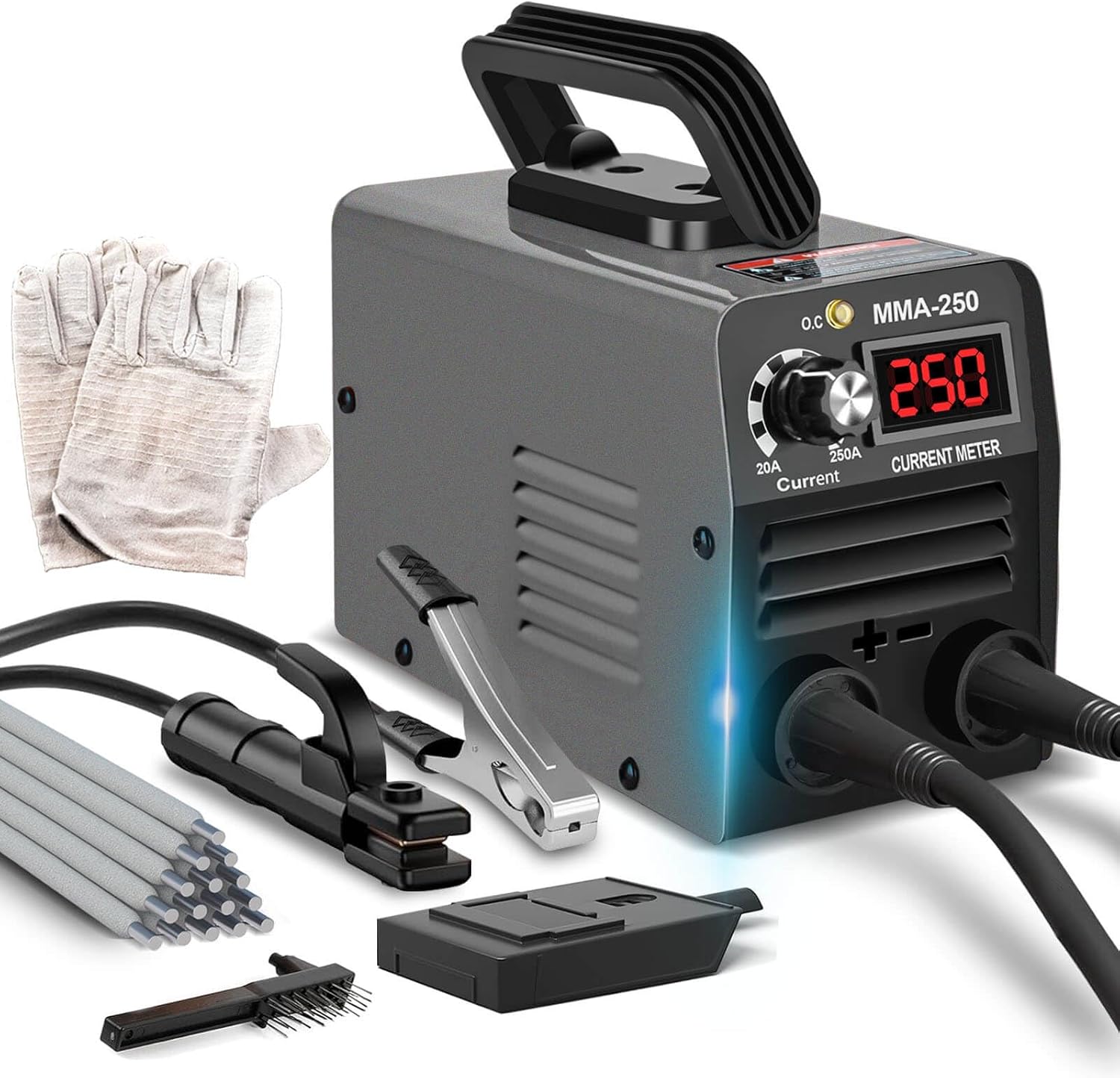
HGNVGZ Super Mini Stick Welder (Gray)
Gray 250 A mini stick welder kit for beginners, with hot‑start, arc‑force, anti‑stick and 10 rods, in a compact, lightweight housing.
Check PriceWhy it stands out
Functionally similar to the orange model, this gray version gives you the same ultra‑portable performance with a more neutral color and slightly different packaging.
Key points
- 110 V input, up to 250 A output
- IGBT inverter, hot‑start, arc‑force, anti‑stick
- Includes rods, gloves, earth clamp, electrode holder
- Weight about 6.3 lb with accessories
Pros
- Very small footprint for storage and transport
- Simple front controls; good for first‑time users
- Enough power for light structural work in short runs
Cons
- Limited to stick welding
- Entry‑level build quality on cables and clamps
- High amps require careful attention to duty cycle
Best for
DIYers who want a very small, inexpensive welder for occasional home projects and prefer a low‑key gray finish.
8. PANERGYRIC 160A 3‑in‑1 Welder – Best Beginner 3‑in‑1 with Digital Display
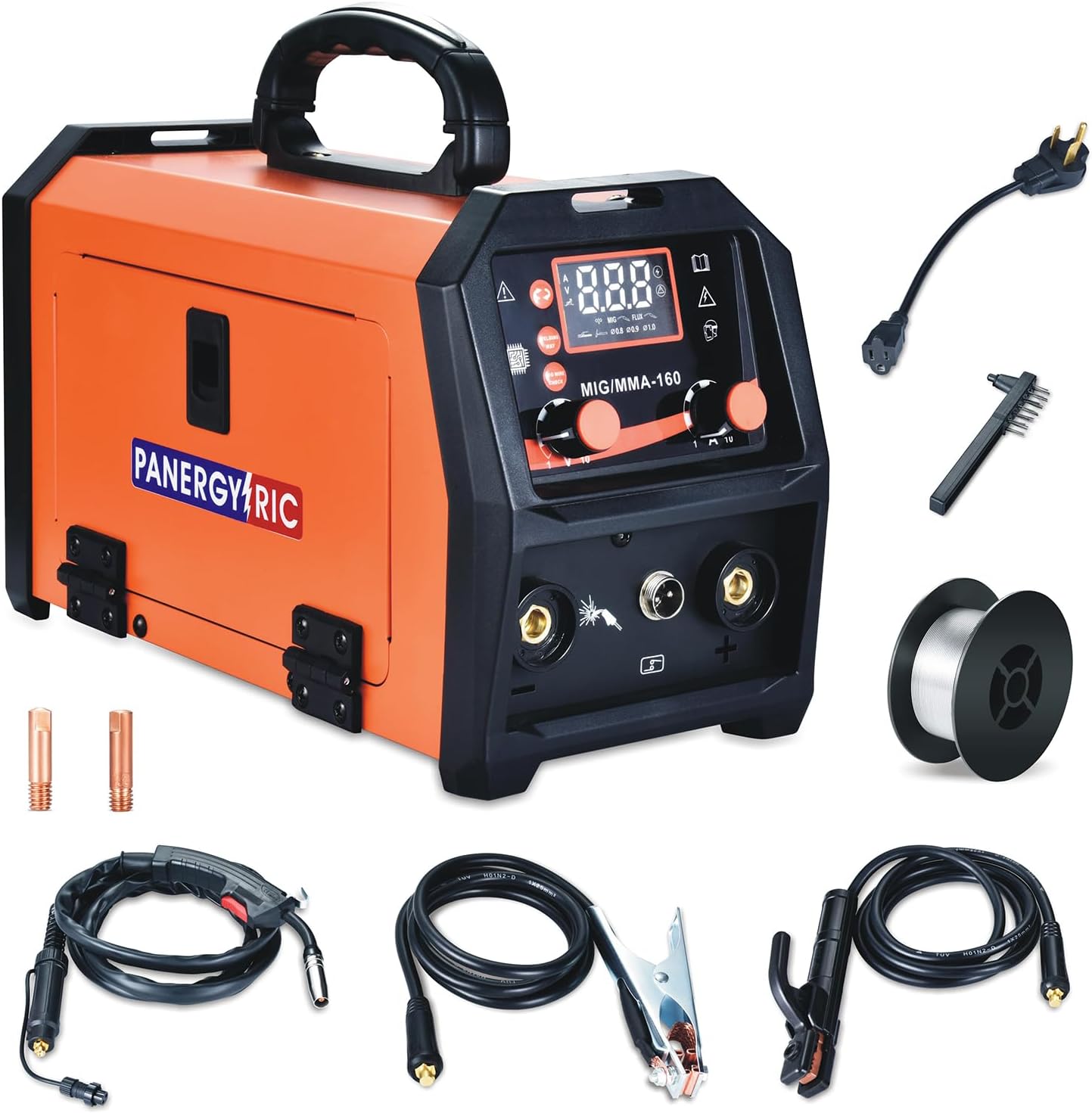
PANERGYRIC 160A 3 in 1 Welder
Dual‑voltage 160 A 3‑in‑1 machine that can do gasless MIG, Lift TIG, and stick, with a big LED display and synergic control for simplified setup.
Check PriceWhy it stands out
This welder introduces you to wire‑feed MIG, stick, and Lift TIG without overwhelming you, synergic mode sets sensible defaults and the big screen makes settings easy to read.
Key points
- 160 A output, dual‑voltage 110/220 V
- Processes: gasless flux‑core MIG, Lift TIG, stick
- Includes MIG torch, earth clamp, stick holder, flux wire, tips
- LED display shows amps, mode, and voltage
- 4.4★ rating from 50+ buyers
Pros
- Versatile 3‑in‑1 capabilities for one price
- Synergic control helps beginners stay in the right zone
- Lightweight (≈9 lb) and easy to move
- Comes with most accessories you need to start
Cons
- Lift TIG still has a learning curve
- Flux‑core only out of the box (no gas MIG hardware)
- Not ideal for continuous heavy fabrication work
Best for
New welders who want to learn MIG first but also experiment with stick and Lift TIG as their skills grow.
9. XR MARKET 160A 3‑in‑1 Welder – Best Beginner Combo with Safety Glasses
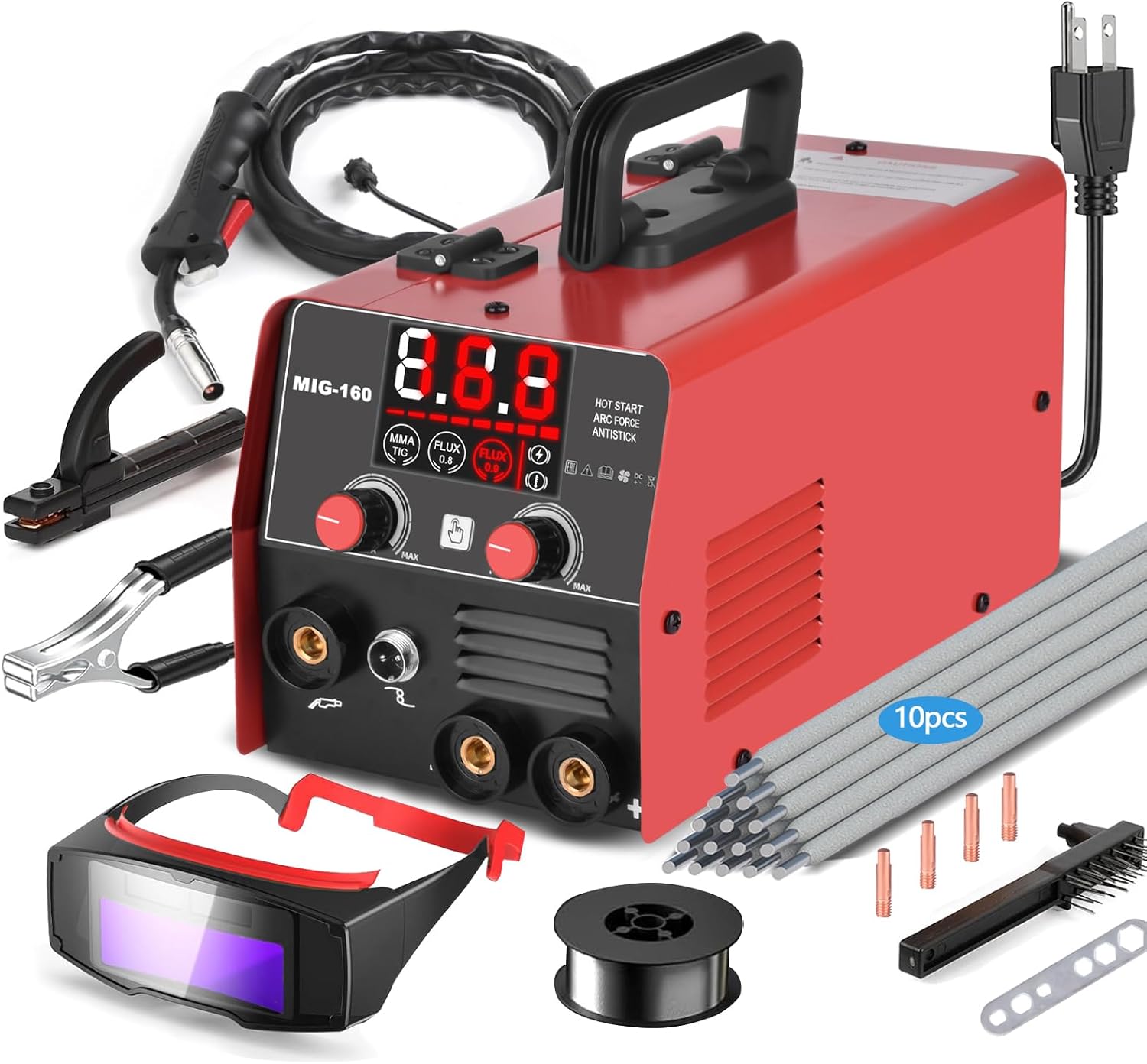
XR MARKET 160A 3 in 1 Welder
110 V 160 A multi‑process welder (flux‑core MIG, Lift TIG, stick) that includes auto‑darkening welding glasses, wire, and rods in one starter package.
Check PriceWhy it stands out
This kit doesn’t just give you a welder, it includes auto‑darkening goggles, wire, and rods so you can begin welding right away.
Key points
- 160 A output, 110 V input
- 3‑in‑1: flux‑core MIG, Lift TIG, stick
- Includes MIG torch, earth clamp, electrode holder, wire, tips
- Auto‑darkening welding goggles in the box
- Large LED display; compact body (about 6.3 × 6.3 × 7.5 in)
Pros
- Full starter kit for both MIG‑style and stick welding
- Auto‑darkening goggles included (good for first attempts)
- Easy to carry and store
- Good value considering all accessories
Cons
- Goggles are less protective than a full helmet
- No gas MIG hardware included
- 110 V only; less power than dual‑voltage units
Best for
Beginners who want a truly all‑in‑one starter package for light MIG and stick work and don’t yet own a welding helmet.
10. WIN‑WIN 200A Arc200 – Best Simple 200 A Stick Welder
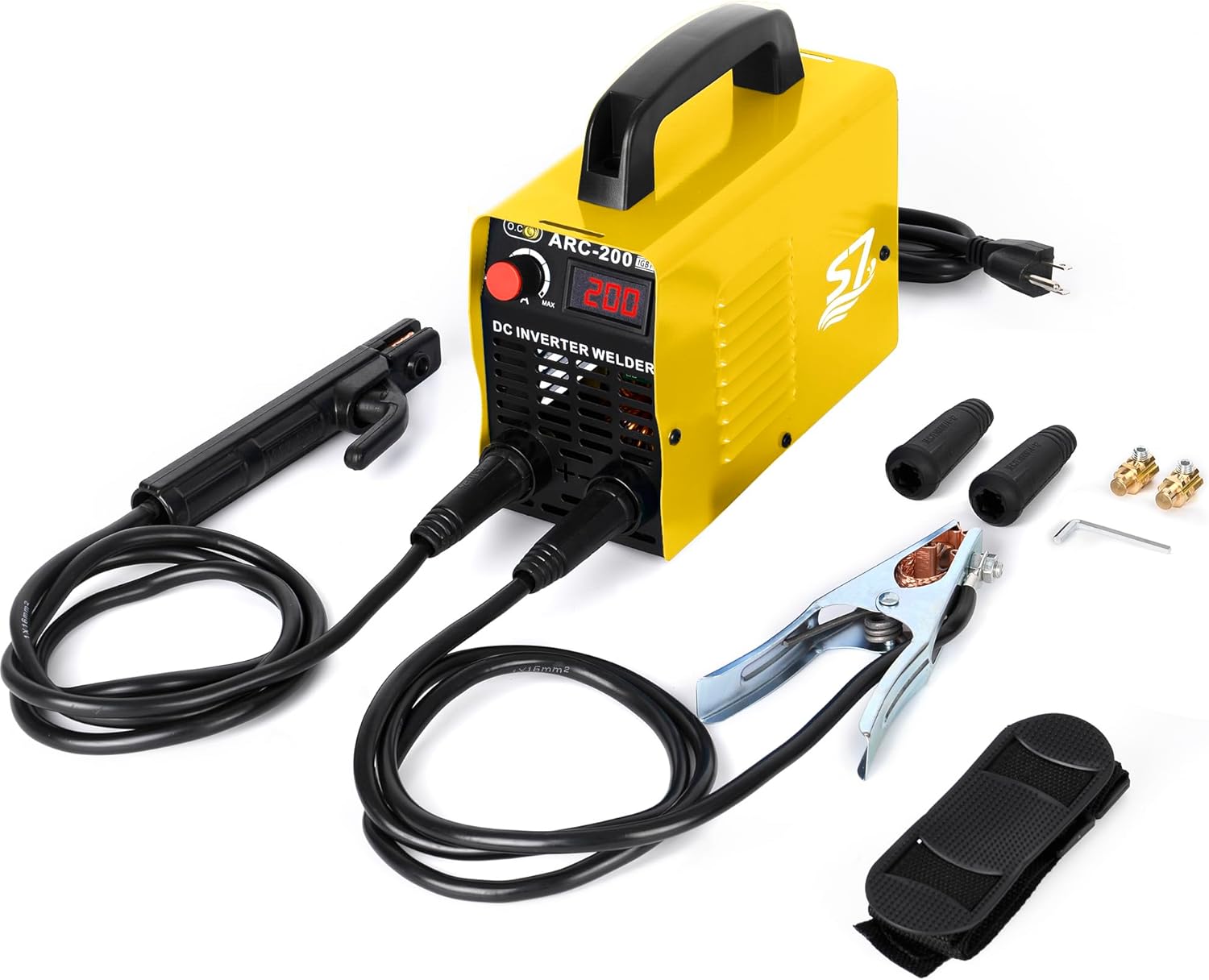
WIN‑WIN 200A Welding Machine (Arc200)
110 V, 200 A beginner stick welder with LCD display, simple knob control, and built‑in protections, designed for all‑day DIY and repair work.
Check PriceWhy it stands out
This is a straightforward stick welder that focuses on stable output and cooling, not on extra modes, making it easy for new users to understand and trust.
Key points
- 110 V input, 200 A max output
- Digital LCD display and single control knob
- Designed for longer welding sessions with good heat dissipation
- Weighs about 7.6 lb; compact case
- 4.4★ rating from over 2,000 users
Pros
- Very simple interface; good learning tool
- Stable output and cooling for a budget unit
- Handles common steels used in home projects
- Excellent user feedback at its price point
Cons
- Stick‑only, no MIG or TIG modes
- No included rods or helmet, some kits give more extras
- Single‑voltage 110 V limits max thickness vs dual‑voltage machines
Best for
Beginners who want a no‑frills, well‑reviewed stick welder for regular home use and don’t need multiple processes.
11. ACEWELDER 140A MIG140PRO‑HM – Best 3‑in‑1 with Included Helmet
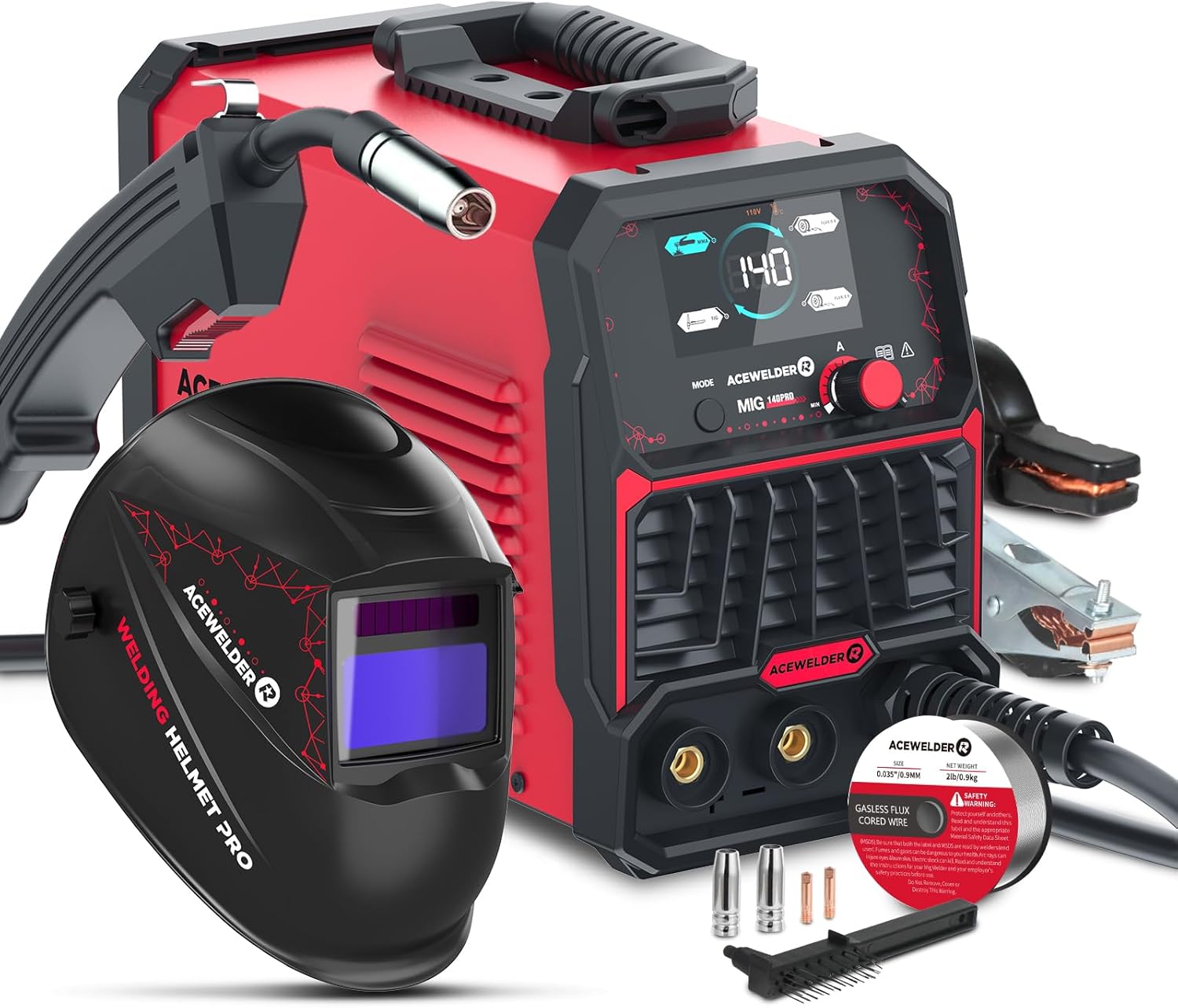
ACEWELDER 140A 3 in 1 MIG Welder
110 V, 140 A multi‑process welder for flux‑core MIG, Lift TIG, and stick, with synergic control, LED display, and a professional welding helmet in the box.
Check PriceWhy it stands out
The included helmet and MIG wire make this one of the most complete beginner bundles for those leaning toward MIG but wanting stick and TIG options too.
Key points
- 140 A output, 110 V input
- 3‑in‑1: flux‑core MIG, stick, Lift TIG
- LED display and synergic control for MIG
- Includes MIG torch, clamps, wire, tips, and helmet
- Weighs about 18.6 lb, still portable
Pros
- Helmet plus welder reduces extra buying decisions
- Synergic control simplifies MIG setup
- Multi‑process flexibility for learning different methods
- Backed by a 2‑year guarantee
Cons
- Heavier than tiny mini‑welders
- 140 A limit restricts very thick materials
- Gas MIG not included, flux‑core only out of the box
Best for
Beginners who want to focus on MIG welding but also have stick/Lift TIG as backup processes, and who prefer to get a helmet in the same kit.
12. HGNVGZ Super Mini Stick Welder (Red) – Best Compact DIY Welder
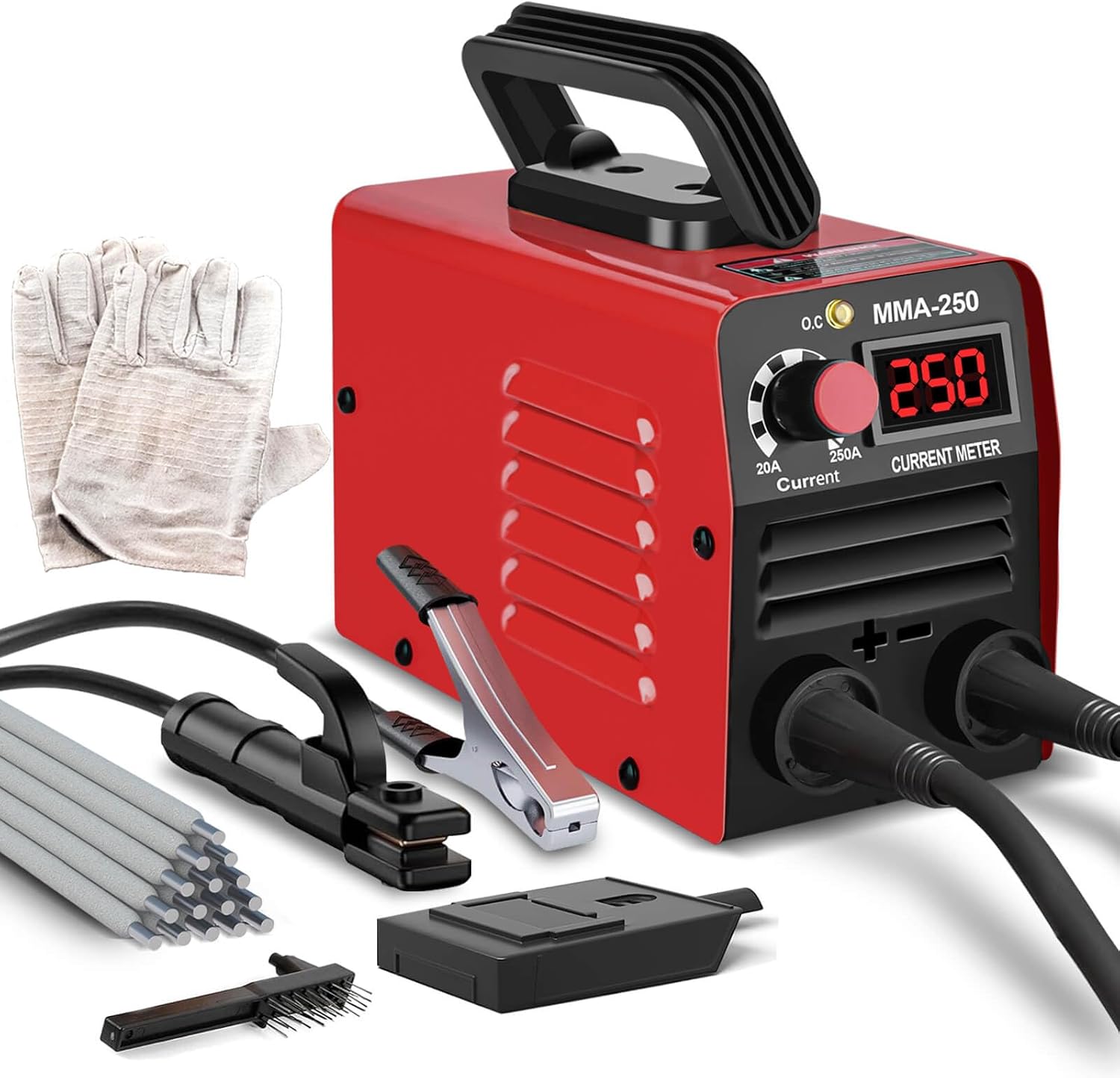
HGNVGZ Super Mini Stick Welder (Red)
Red 110 V, 250 A mini stick welder kit with rods, clamps, and gloves, using IGBT inverter technology, hot‑start and anti‑stick functions.
Check PriceWhy it stands out
It’s essentially the same proven mini‑welder as the gray/orange versions, in a bright color that’s easy to see in a busy garage or jobsite.
Key points
- 110 V input, nominal 250 A output
- Inverter‑based hot‑start, arc‑force, anti‑stick
- Includes 10–15 rods, leads, earth clamp, gloves
- Weight about 6.2 lb; compact body
Pros
- Full beginner kit in one small package
- Very portable and easy to stash in small spaces
- Simple front panel and good arc for the price
Cons
- No MIG or TIG modes
- Light‑duty leads ideal only for hobby use
- Can be confusing if stock varies between 10 and 15 rods
Best for
DIY users who like the idea of a tiny, all‑in‑one stick setup and don’t mind its light‑duty nature.
13. YesRight 200A Mini Stick Welder – Best Stick Welder with Goggles Included
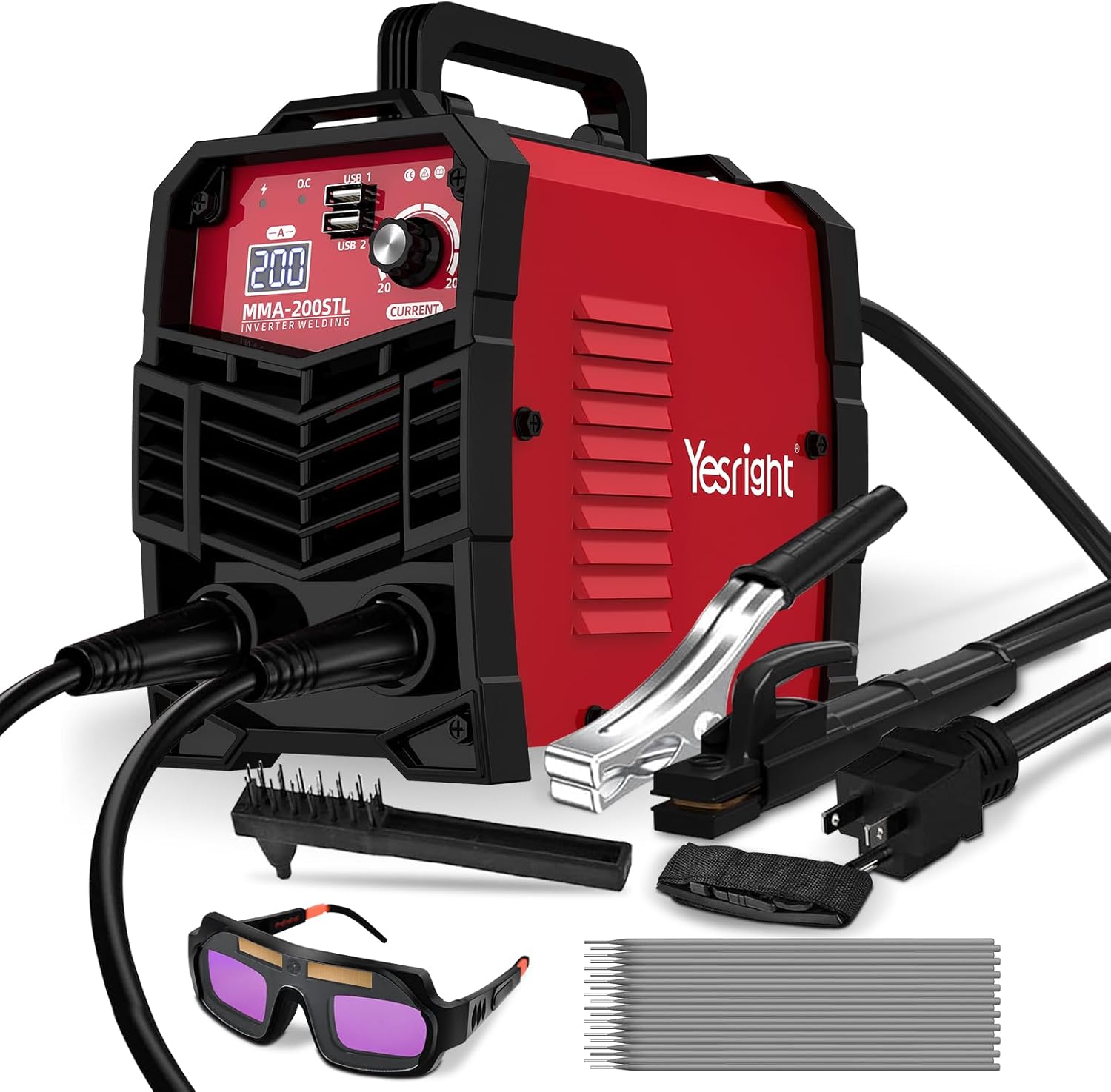
YesRight 200A Mini Stick Welder
110 V, 200 A stick welder with hot‑start and IGBT inverter, bundled with 20 rods, welding goggles, and tools for beginners and DIY users.
Check PriceWhy it stands out
Auto‑darkening goggles and a generous rod assortment make this a ready‑to‑weld package that reduces the number of extras a beginner has to buy.
Key points
- 110 V input, 20–200 A current
- Stick (MMA) process with hot‑start, anti‑stick
- Supports 1.6–3.2 mm (1/16″–1/8″) electrodes
- Includes 20 rods, goggles, hammer, brush
- About 7.8 lb; compact dimensions around 8.7 × 7.9 × 4.9 in
Pros
- Includes basic auto‑darkening eye protection
- Reasonable power for a 110 V welder
- Simple controls suitable for brand‑new welders
- Can handle stainless and low‑carbon steel with suitable rods
Cons
- Goggles less protective than a full helmet
- Stick‑only; limited if you want MIG later
- Build quality is more hobby than industrial
Best for
First‑time welders who want a simple stick welder and don’t have any welding eye protection yet.
14. YESWELDER ARC‑125DS‑LT – Best Beginner Stick + Lift TIG Combo
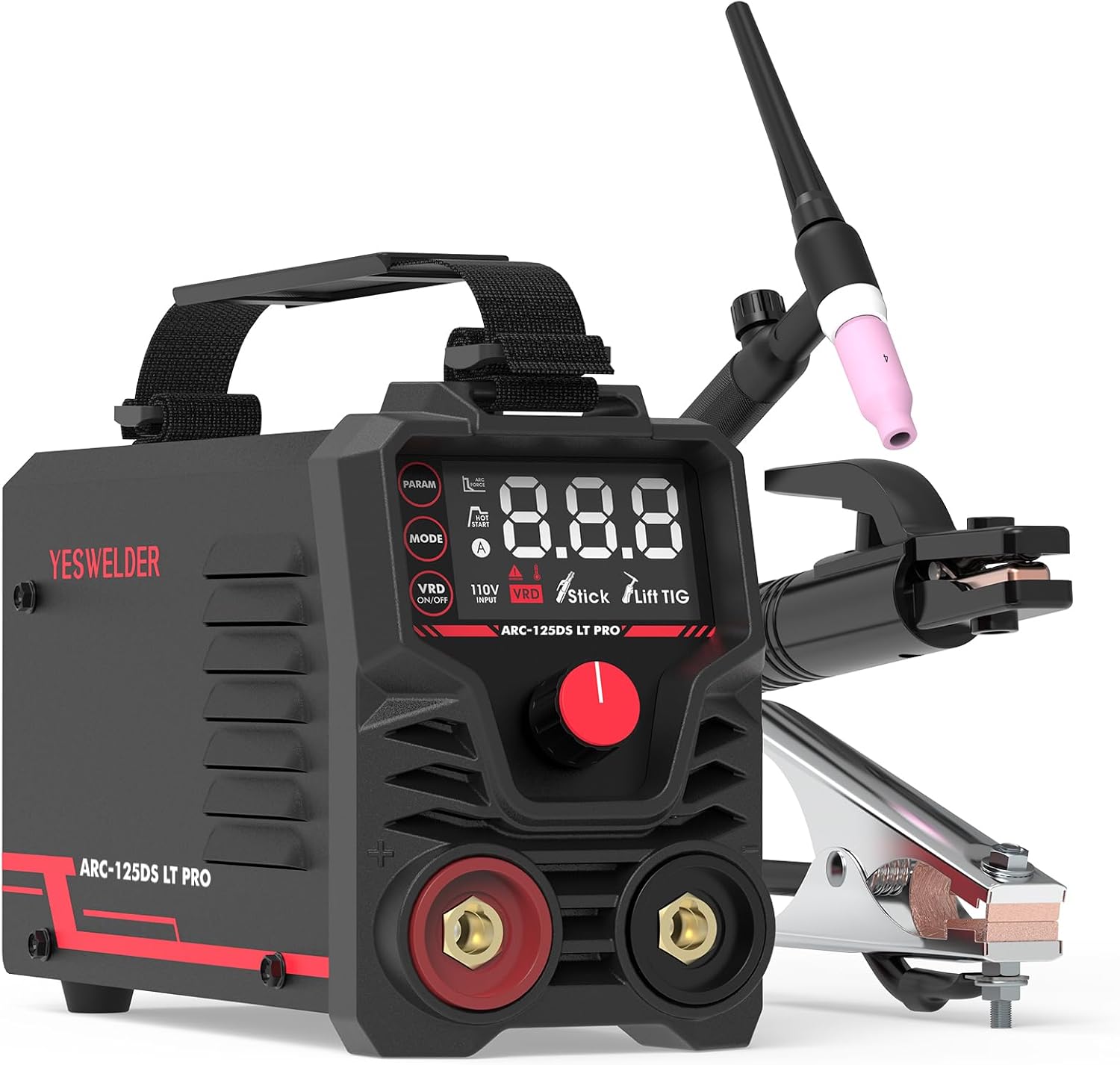
YESWELDER 125Amp Mini Stick Welder with Lift TIG Torch
125 A, 110 V mini welder with a large LED screen, stick and Lift TIG modes, hot‑start and arc‑force, in a very compact, 4.4 lb package.
Check PriceWhy it stands out
The combination of a big, easy‑to‑read LED display and included Lift TIG torch makes this a great first welder for those curious about both stick and basic TIG.
Key points
- 110 V only, 20–125 A output
- Processes: stick and Lift TIG (with included torch)
- Large LED display shows amp setting and modes
- Very compact (≈9.3 × 3.7 × 5.1 in), around 4.4 lb
- 4.5★ average rating from thousands of users
Pros
- Lightweight and extremely portable
- Friendly interface for beginners
- Lift TIG mode adds more control for thin metal
- Comprehensive safety features (over‑current, over‑heat, etc.)
Cons
- 125 A is limited for thicker material
- Requires a gas bottle and regulator for TIG
- Short leads may need upgrading for comfort
Best for
Beginners who want a very small machine to learn stick on, with the option to dabble in Lift TIG on thin material.
15. HGNVGZ MMA‑250 Upgraded – Best Heavy‑Duty 110 V Stick for Starters
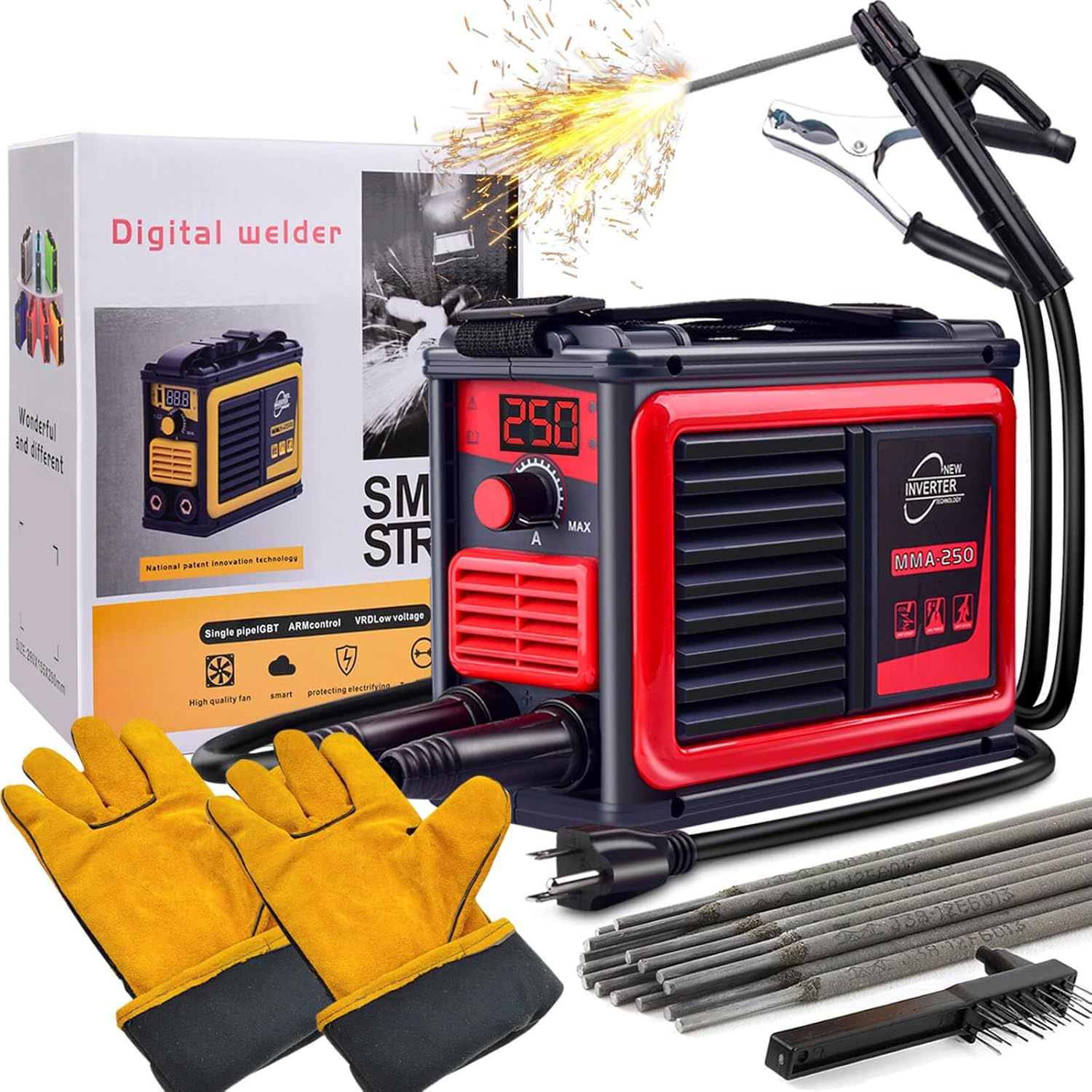
HGNVGZ MMA‑250A Upgraded 110V Welder
250 A 110 V stick welder with upgraded IGBT inverter, LCD display, 360° cooling, and hot‑start/anti‑stick, aimed at heavier DIY work.
Check PriceWhy it stands out
Compared to mini stick welders, this upgraded MMA‑250A focuses on stronger cooling and stable 250 A output, making it better suited to repeated use and thicker stock.
Key points
- 110 V input, up to 250 A output
- Digital LCD display for current setting
- Hot‑start, arc‑force, anti‑stick
- 360° cooling design with ABS case
- 4.4★ from around 1,000 reviewers
Pros
- High output from a 110 V machine (within duty‑cycle limits)
- Better cooling than many small welders
- Simple controls and clear display
- Very competitive price for power level
Cons
- Stick‑only, no MIG or TIG support
- Needs good power supply; long extension cords can cause trouble
- No extras like rods or helmet in some bundles
Best for
Beginners who know they’ll do more frequent, heavier stick welding and want a budget machine with more robust output and cooling.
16. YESWELDER MIG‑165DS PRO – Best 4‑in‑1 Multi‑Process Beginner Welder
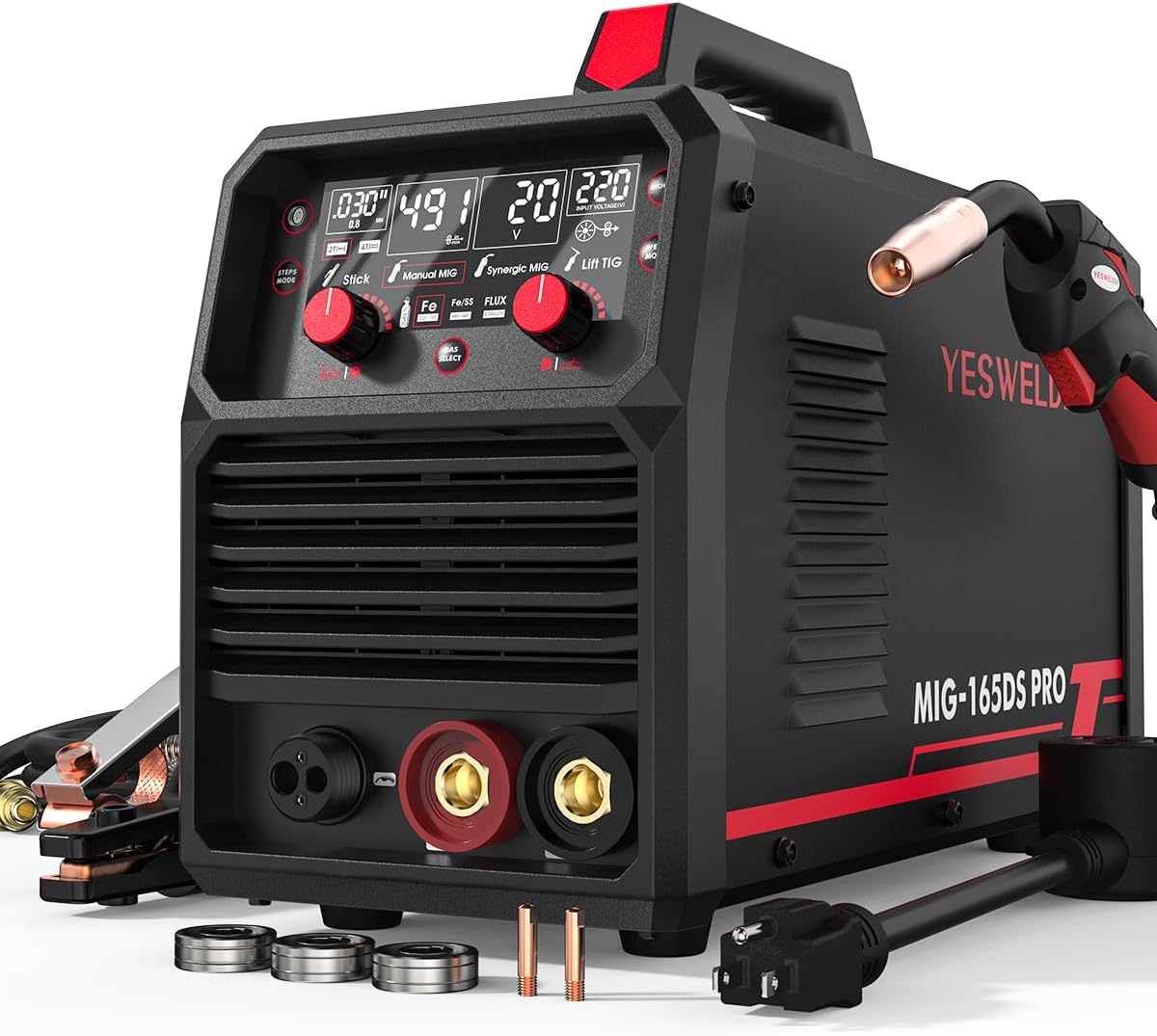
YESWELDER 165A MIG‑165DS PRO 4 in 1 Welder
165 A dual‑voltage 4‑in‑1 machine that handles flux‑core MIG, gas MIG, stick, and Lift TIG with synergic control and LED screen.
Check PriceWhy it stands out
Few machines at this price give you true MIG (gas or gasless), stick, and Lift TIG in one box, with automatic synergic settings that help beginners avoid common mistakes.
Key points
- 165 A output, dual‑voltage 110/220 V
- 4 processes: flux‑core MIG, gas MIG, stick, Lift TIG
- Supports .023″–.035″ wire, 2 lb/10 lb spools
- Adjustable hot‑start, arc‑force, anti‑stick & VRD for stick
- 4.5★ rating from over 2,000 users
Pros
- Extremely flexible, covers almost all home welding needs
- Synergic MIG simplifies parameter selection
- Detachable torch and good feature set for the money
- Good balance of power and portability
Cons
- More complex front panel than single‑process machines
- Requires gas setup for full MIG/TIG use
- Heavier than mini stick welders
Best for
Ambitious beginners who want one machine that can grow with them from basic flux‑core MIG into full gas MIG, stick, and simple TIG.
17. TOOLIOM 195A Stick/Lift TIG – Best Dual‑Voltage Stick/TIG for Progressing Beginners
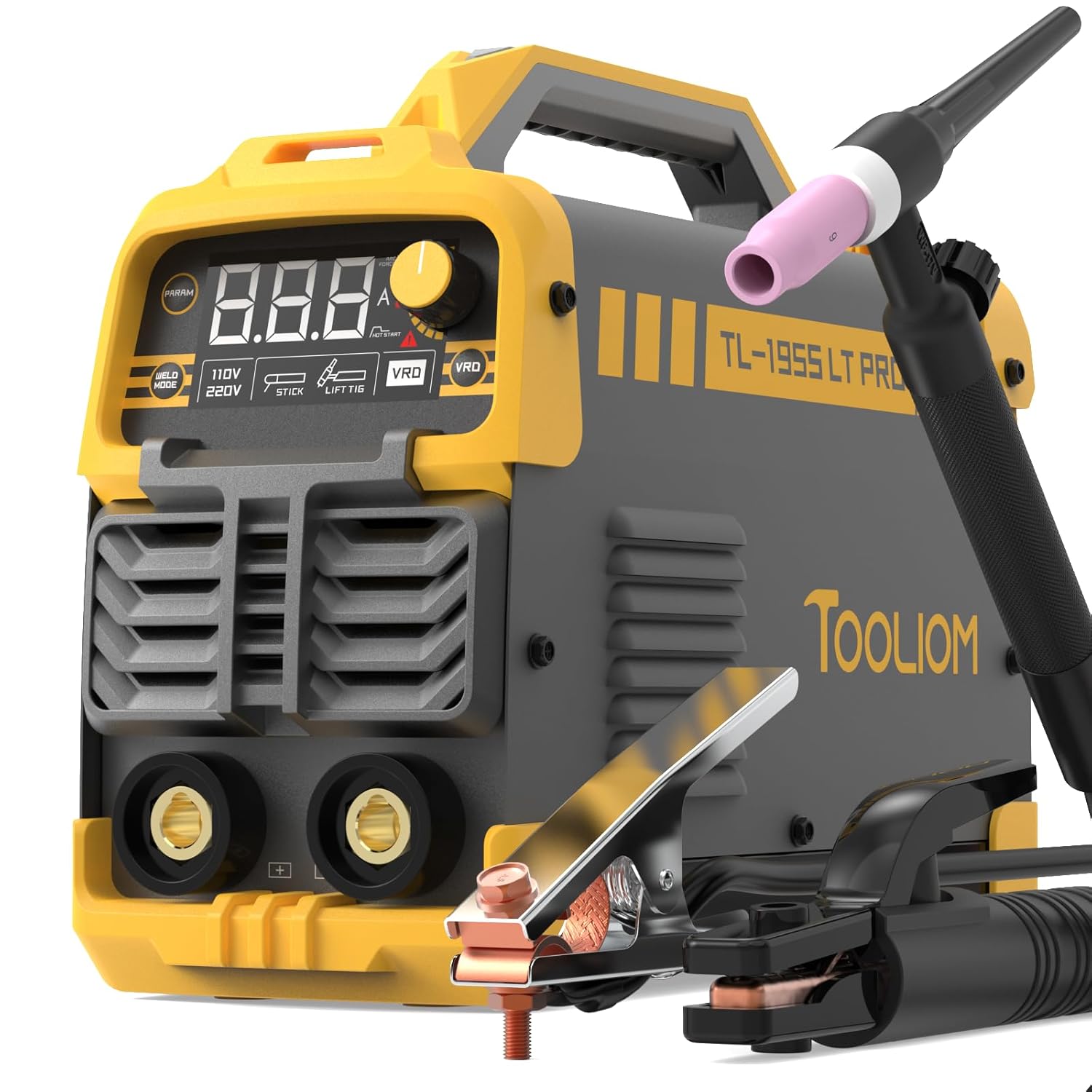
TOOLIOM 195A Stick/Lift TIG Welder
195 A dual‑voltage stick and Lift TIG welder with synergic control, VRD, hot‑start, and arc‑force, plus an LCD panel for clear settings.
Check PriceWhy it stands out
TOOLIOM adds more professional‑style features like VRD and advanced arc controls, making this a good bridge between beginner and serious hobby or light professional use.
Key points
- 195 A max output, dual‑voltage 110/220 V
- Processes: stick and Lift TIG (torch included)
- LCD panel with synergic routines
- Adjustable hot‑start, arc‑force, and anti‑stick; VRD on/off
- 4.5★ rating from over 3,000 users
Pros
- Strong, smooth arc with plenty of adjustment
- Dual‑voltage flexibility for garage or shop
- Good for both basic stick and cleaner TIG work
- Feature set rivals more expensive brands
Cons
- No MIG mode, strictly stick and Lift TIG
- Heavier and bulkier than mini welders
- More controls to learn than very basic boxes
Best for
Beginners who want a welder they won’t outgrow quickly and who may move into more precise TIG or higher‑amp stick work later.
How to Choose the Right Best Welder for Beginners
Use these steps to narrow down your first welder:
- Decide where you’ll weld most
- Only a standard household outlet? Choose 110 V (or dual‑voltage).
- Have a 220 V outlet or can install one? A dual‑voltage unit gives you more power.
- Pick your first process
- MIG / flux‑core – easiest to learn, best for clean, consistent beads.
- Stick (MMA) – cheap, tough, works outdoors on dirty steel.
- TIG – precise and clean, but slower and more advanced.
- Match amperage to your projects
- Thin sheet and light brackets: ~100–140 A is fine.
- 1/8″–1/4″ steel and structural repairs: ~160–250 A is better.
- Think about portability and space
- Small garage / need to move it often? Mini inverters (5–15 lb).
- Fixed bench setup? A heavier multi‑process unit is OK.
- Consider how much help you want
- Synergic control and big LED screens are great if you want the machine to suggest good settings.
- Simple knob‑only stick welders are fine if you like manual control and don’t mind a bit of trial and error.
- Check what’s in the box
- Some models include rods, wire, and a helmet or goggles.
- Factor in the cost of PPE and consumables if they are not included.
Why Best Welders for Beginner Matter
Choosing the right beginner welder matters because it:
- Reduces frustration – forgiving arc characteristics and automatic settings make learning smoother.
- Improves safety – built‑in protection circuits and quality components limit dangerous failures.
- Saves money long‑term – a solid starter machine can last years and handle many projects.
- Supports skill growth – versatile or multi‑process units let you try new techniques without buying new machines immediately.
Key Features of the Welders for Beginners
Look for these core features:
- IGBT inverter power – lighter, more efficient, and smoother arcs than old transformer units.
- Hot‑start / arc‑force / anti‑stick – especially important on stick welders to prevent constant rod sticking.
- Dual‑voltage (110/220 V) – more flexibility and higher power options if you later add a 220 V outlet.
- Digital or LED display – clearer feedback on amps/volts, easier to repeat good setups.
- Built‑in safety – protection against over‑current, over‑voltage, over‑heat, and short‑circuits.
- Starter accessories – rods, wire, leads, clamps, and sometimes goggles or helmets so you can start quickly.
Best Types of Welders for Beginners
- Entry‑Level Stick Welders
Cheapest and most rugged. Great for outdoor, rusty, or farm repair work where appearance matters less. - Flux‑Core MIG Welders
Easy to learn, no gas bottle needed. Good compromise between ease and cost. - Gas MIG / Flux‑Core Combo
Let you start on gasless wire and upgrade to cleaner gas MIG later. - Multi‑Process (MIG/Stick/TIG)
Highest flexibility. One machine can handle thin sheet with MIG, heavy plate with stick, and fine work with Lift TIG. - Mini Super Portable Welders
Good if you only have small repairs, limited storage, or want to throw a welder in the truck for occasional jobs.
Comfort Factors Welders Should Not Ignore
Even welders need comfort to stay productive:
- Machine weight – lighter units are easier to move; heavier ones can be fine if they stay put.
- Cable length and flexibility – longer, softer leads let you move around the workpiece more easily.
- Noise and fan behavior – quieter and on‑demand fans are less annoying in small shops.
- Control layout – knobs and buttons should be reachable with gloves on, and labels clear enough to read at a glance.
Common Mistakes When Buying Welders for Beginners
Avoid these typical pitfalls:
- Buying the cheapest possible machine – can mean poor duty cycle, unreliable protection circuits, and frustrating arc behavior.
- Ignoring process needs – buying a stick‑only unit when you really want clean MIG welds on sheet metal.
- Overbuying complexity – a feature‑packed multi‑process machine is great, but only if you’ll actually use the extra modes.
- Forgetting about PPE and consumables – rods, wire, gas, helmet, gloves, and clamps all add to the real cost.
- Not checking power availability – a 220 V‑only welder is useless if you can only plug into 110 V outlets.
How Long Do Welders for Beginners Last?
Beginner‑grade inverter welders usually last:
- 2–5 years of regular hobby use
- Longer if used lightly and stored well
Lifespan depends on:
- Duty cycle and usage – pushing them at max amps for long periods shortens life.
- Environment – dust, moisture, and impacts are hard on electronics.
- Care – keeping vents clean, checking leads, and not dropping the unit.
Replace or service your welder if:
- The arc becomes very unstable despite trying different rods/wire.
- Overheating or shutdown happens frequently at normal settings.
- Cables, plugs, or internal components show heat damage or cracks.
FAQs – Best Welders for Beginners
What is the easiest welding process for a beginner?
For most people, flux‑core MIG is the easiest: pull the trigger and move along the joint. Stick is tougher at first but cheaper and more portable. TIG is the most precise but hardest to learn.
Do I really need dual‑voltage?
Not always. If you only have standard 110 V outlets and won’t upgrade, a 110 V‑only unit is fine. If you might add a 220 V outlet or work in different locations, dual‑voltage gives useful flexibility and more power.
How much should I spend on my first welder?
For hobby use, good beginner welders usually fall in the $80–$250 range depending on process and features. Spending a bit more for a reliable brand or multi‑process machine can pay off if you weld regularly.
Can a mini welder handle serious work?
Mini inverters can do real work within their duty cycle. They’re great for short runs, light to medium thicknesses, and occasional repairs. For heavy, prolonged welding on thick steel, a larger, higher‑duty machine is better.
Should I start with a multi‑process welder or a simple stick/MIG only?
If budget allows and you’re serious about learning, a multi‑process unit gives the most room to grow. If you are unsure how often you’ll weld, a simple, good‑quality stick or flux‑core MIG is enough to get started without overcomplicating things.
Conclusion
A good beginner welder should be:
- Easy to set up and adjust
- Forgiving to learn on
- Safe and reliable
- Matched to your power and project needs
If you mainly want simple, tough welding on a tight budget, look at compact stick machines like the Hpoouo 200A, GNI Super MINI, or HGNVGZ MMA‑250A.
If you want cleaner, easier welds and room to grow, choose a wire‑feed or multi‑process unit such as the Weldpro 155 Amp MIG, YESWELDER MIG‑165DS PRO, PANERGYRIC 160A, or ACEWELDER 140A kit.
Match the machine to your available power, the thickness of metal you’ll weld, and how often you plan to work. Do that, and your first welder will help you build skills, not bad habits, and you’ll be set up for many successful projects ahead.

James is a welding expert, accomplished author, and trusted guide with over 8 years of experience in the industry. With his in-depth knowledge and engaging writing style, James has become a true authority in the field, offering readers and clients invaluable expertise and insights to take their welding skills to new heights.

